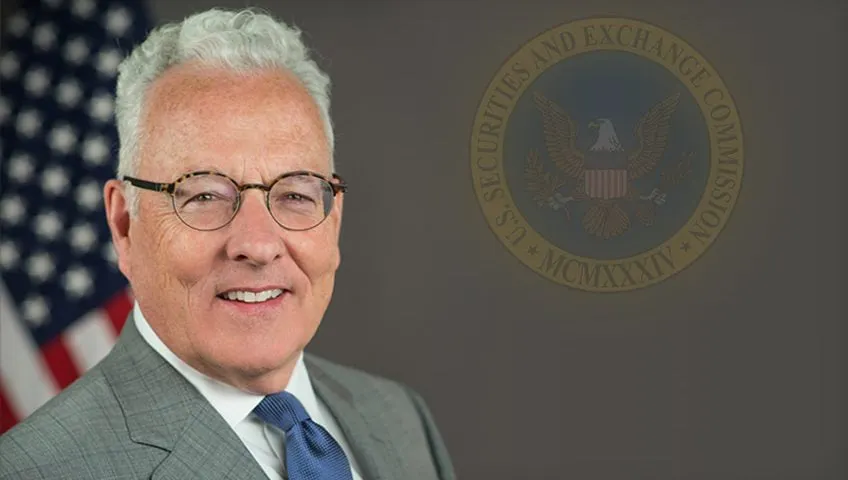An adage for the digital age says nothing can ever be deleted from the internet. Yet, the Securities and Exchange Commission (SEC) has done its best to scrub the biography page of William Hinman.
Hinman was the director of the SEC's corporation finance division from 2017 through 2020.
While Hinman’s bio page on the SEC’s website once delved into the former director’s professional past, the details it contains are now scant. A synopsis of Hinman’s path to the SEC has been replaced with mostly blank space.
The SEC’s alterations may seem minor, but Hinman is best known among digital asset enthusiasts for a speech he gave in 2018. During the now-controversial talk, he opined about how decentralization impacts Ethereum and Bitcoin's regulatory classification.
He said crypto’s two most significant coins should not be considered securities because they were sufficiently decentralized—from his point of view. And years later, Hinman’s speech looms large in the SEC’s ongoing case against Ripple over the XRP token.
The most recent snapshot of Hinman’s biography page, dated Feb. 9 and hosted on the Internet Archive’s Wayback Machine, shows a robust account of Hinman’s career—from his early days on the editorial board of Cornell Law Review in law school to his time as a partner at Silicon Valley office of Simpson Thacher & Bartlett LLP.
Now, it contains a single line, which concisely states Hinman served as the director of the SEC’s division of corporate finance from May 2017 to December 2020. The SEC did not immediately respond to a request for comment from Decrypt on why or exactly when the change took place. Meanwhile, the biography pages of others that held the same title as Hinman at one point, such as Renee Jones, appear untouched.
Hinman’s updated history was called into question by an account that goes by “Mr. Huber” on Twitter on Monday. The account belongs to a self-described “sleuth looking for truth,” who also claimed the change was nefarious in nature.
“The [SEC] has now removed Bill Hinman's biography from its website,” he said, adding the agency is “getting ready to throw him under the bus.”
The @SECGov has now removed Bill Hinman's biography from its website. Getting ready to throw him under the bus. pic.twitter.com/O7HCUGWSgt
— Mr. Huber🔥🦅🔥 (@Leerzeit) June 5, 2023
America’s financial watchdog has hounded Ripple in court for years, having accused the company of selling XRP without registering the token as a security in late 2021.
The case calls into question under what circumstances a token could be considered a commodity and would thus be regulated primarily by the Commodity Futures Trading Commission as opposed to the SEC.
Weeks ago, the judge presiding over the SEC’s case against Ripple denied the commission’s motion to keep the documents related to the now-infamous speech from being made public. Ripple and its legal team obtained the documents in October.
The discovery process in the SEC v. Ripple battle has revealed that Hinman likely met with organizations close to Ethereum, such as ConsenSys and the Ethereum Foundation, around the time he said the network was sufficiently decentralized, according to court documents.
At the same time, Hinman’s notion of decentralization is working its way into legislative proposals aimed at the digital assets industry. Messari founder Ryan Selkis said a draft bill on crypto oversight being sponsored by Republican lawmakers could enshrine Hinman’s point of view into law.
3/ Second, there is at least an attempt in this bill to operationalize the "Hinman test" or what constitutes "sufficient decentralization" of a crypto project.
This would likely mean significant SEC oversight, but could also open the door to something like a Safe Harbor.
— Ryan Selkis 🪳 (@twobitidiot) June 2, 2023
“There is at least an attempt in this bill to operationalize the ‘Hinman test’ or what constitutes ‘sufficient decentralization’ of a crypto project,” he said. “This would likely mean significant SEC oversight, but could also open the door to something like a Safe Harbor.”
Selkis’ mention of a “Safe Harbor” is likely an allusion to rules proposed by SEC commissioner Hester Pierce in 2021. Floated as Safe Harbor 2.0, the guidelines give projects a three-year window to determine whether the tokens they use are securities while adhering to reporting requirements.

